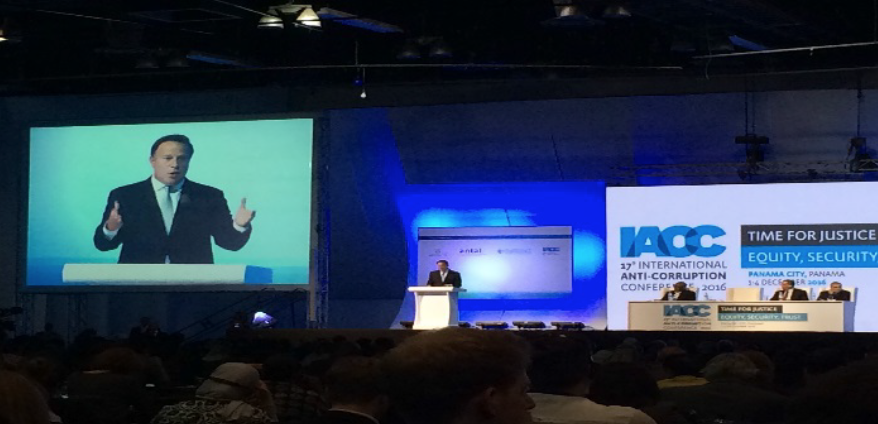
At International Anti-Corruption Conference, Calls for Sustained—and Heightened—Vigilance
Earlier this month, I attended the International Anti-Corruption Conference, joining leading activists and advocates from around the world. Taking place in Panama City, the home of Mossack Fonseca, the event provided an opportunity to reflect on the Panama Papers nine months after their publication.
The government of Panama had agreed to host the IACC eight months prior to the leak. This threw the country into the spotlight. Primarily implicating Mossack Fonseca, the law firm and corporate service provider at the center of the scandal, the papers also raised questions for the Panamanian government.
Panama President Juan Carlos Varela assured the conference that his government had a zero tolerance approach to corruption, but his statements rang hollow. Nobel Laureate Joseph Stiglitz and anti-corruption expert Mark Pieth had resigned from the commission established to review Panama’s financial sector transparency in August. The government, they said, had refused to guarantee the commission’s results would be made public.
 Panama President Juan Carlos Varela opens the IACC.
Panama President Juan Carlos Varela opens the IACC.
Importantly, the leaks focused mainstream media attention on secret offshore companies. Large demonstrations and a public sense of injustice forced officials across the globe to resign and face investigations. The repercussions were also felt in the private sector: recent research shows that the 397 publicly listed firms linked to the papers lost a total of USD 135 billion in market capitalization, demonstrating potential costs to the use of secret corporate vehicles.
The leaks brought a new sense of urgency to the international push for companies to publicly disclose beneficial owners. (This focus was also seen at the U.K. Anti-Corruption Summit in May.) How to build on this momentum was a frequent topic of conversation at IACC.
One positive step came from OpenCorporates, which launched an initiative to create a Global Beneficial Ownership Register. The register tackles the cross-border and highly networked nature of corruption and aims to link beneficial ownership data from corporate registries across the world and establish a common reporting standard.The few private sector IACC participants attending argued that it was time to end anonymous companies. Deloitte partner James “Chip” Cottrell said making the ultimate owner or owners of companies public is vital for business and helps create a level playing field. BHP Billiton Chief External Affairs Officer Geoff Healy said that when a corporate entity is established, it should disclose its beneficial ownership as a prerequisite to exist. Also from the private sector, The B Team worked closely with the Bank of Montreal, Deloitte and Thomson Reuters to develop an online tool that provides businesses with detailed information on beneficial ownership and concrete steps toward ending anonymous companies.
Beneficial ownership transparency just one piece of the puzzle to uncover corruption. It will need to be combined with additional transparency mechanisms like asset declarations by public officials (such as those introduced in Ukraine) and strong domestic legislation to guard against conflicts of interest. Though these issues got less attention at the IACC, they require further analysis.
The United States’ changing political landscape and its potential implications for the fight against corruption loomed large. Carnegie Endowment for International Peace senior fellow Sarah Chayes and Harvard professor Lawrence Lessig argued that President-elect Donald Trump effectively tapped into a U.S. fear of corrupt government officials, pledging to “drain the swamp” in Washington, D.C. Mainstream activists and politicians failed to recognize growing discontent, they said, and the anti-corruption movement now needs to wake up and more effectively address these concerns.
Other IACC speakers voiced fears that significant gains made by the United States in the global fight against corruption will be weakened. For instance, Section 1504 of the Dodd-Frank Act, which requires U.S.-listed oil, gas and mining companies to disclose payments made to governments for natural resource development, introduces greater transparency in resource-rich countries around the world. The American Petroleum Institute, an oil sector lobby group, has fought against this provision for years and blocked its implementation through a lawsuit launched in 2012. As of 2016, the law is back on track. Some are concerned, however, that special interest groups might enjoy even greater leverage in the coming years.
The fate of the Foreign Corrupt Practices Act was a recurring theme of discussion. Trump has said that the FCPA is “horrible law and it should be changed,” raising concerns that this legislation could be weakened or pursued less vigorously by the Department of Justice and the Securities and Exchange Commission. Since the early 2000s, the FCPA has become a key piece of legislation used by those agencies to pursue U.S. and U.S.-listed companies bribing foreign government officials. A change to the FCPA or its implementation would particularly affect companies in the extractive sector, given that a major focus of FCPA investigations have involved oil, gas and mining companies.
It is too soon to tell how the new administration will address transparency and corruption in the extractives sector. The IACC drove home that the global anti-corruption movement needs to brace itself for change, hold on to hard-fought victories and look for new opportunities where they arise.
Max George-Wagner is a governance associate with the Natural Resource Governance Institute (NRGI).
